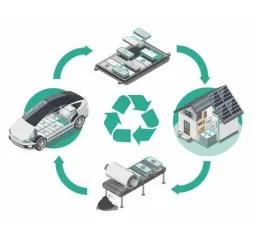
Services

Electric mobility
Electric mobility (e-mobility) involves using electric vehicles (EVs) powered by electricity from renewable sources. It reduces greenhouse gas emissions, decreases dependence on fossil fuels, and offers lower operational costs. E-mobility promotes cleaner air and quieter cities, supporting a sustainable transportation future as charging networks and battery technology continue to improve.

Solar energy
Solar energy harnesses the power of the sun to generate electricity through photovoltaic (PV) panels or solar thermal systems. It is a clean, renewable energy source that reduces greenhouse gas emissions and dependence on fossil fuels. Solar energy is key to sustainable development, providing a reliable and cost-effective energy solution.

Recycling of electric vehicle batteries
Recycling electric vehicle batteries is essential for sustainability, recovering valuable materials like lithium, cobalt, and nickel, and reducing environmental impact. Effective recycling minimizes waste, conserves resources, and decreases the carbon footprint of battery production. It supports a circular economy, ensuring a more sustainable lifecycle for electric vehicles and their components.

Biogas from agricultural waste to produce electricity
Biogas from agricultural waste is a renewable energy source that converts organic material like crop residues and animal manure into methane through anaerobic digestion. This methane is used to produce electricity, reducing greenhouse gas emissions, managing waste sustainably, and providing a reliable, local energy source that supports rural economies and energy independence.
Water Conservation Strategies
Sustainability Training and Workshops
Green Energy Consulting
Waste Management Services

Carbon Footprint Assessment
Sustainable Product Development






Frequently asked questions
- All Questions
- All Questions
- All Questions
